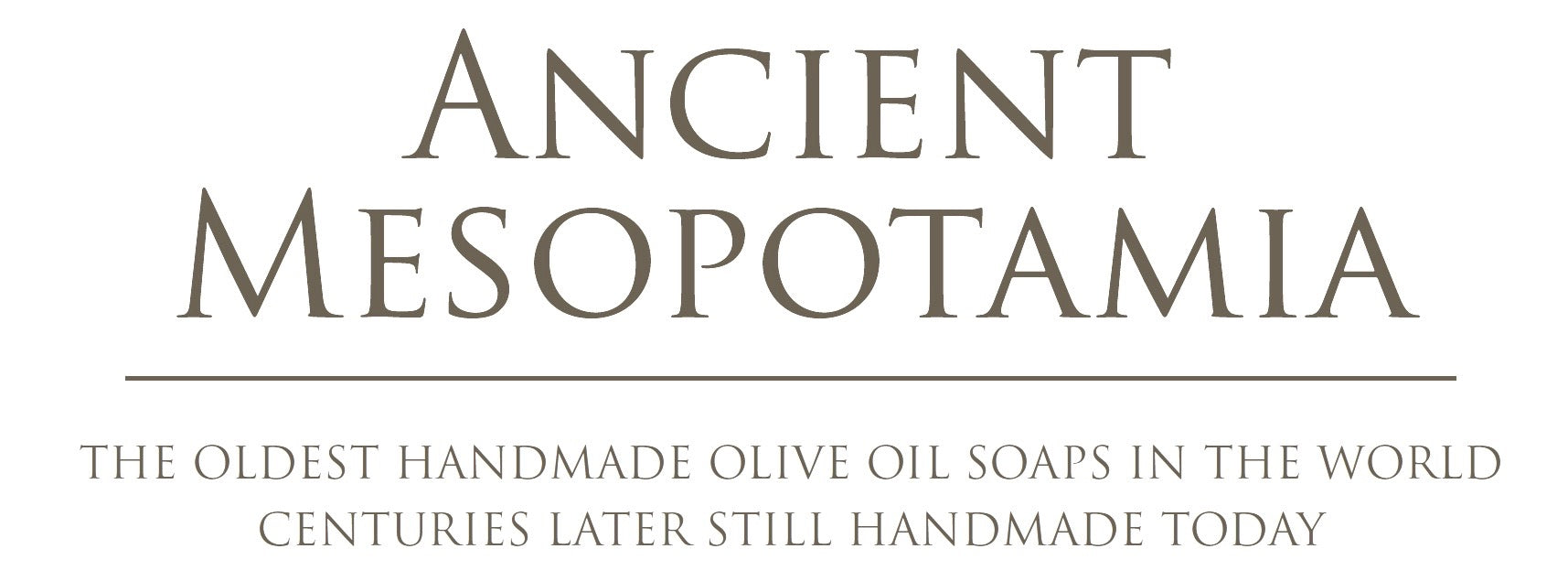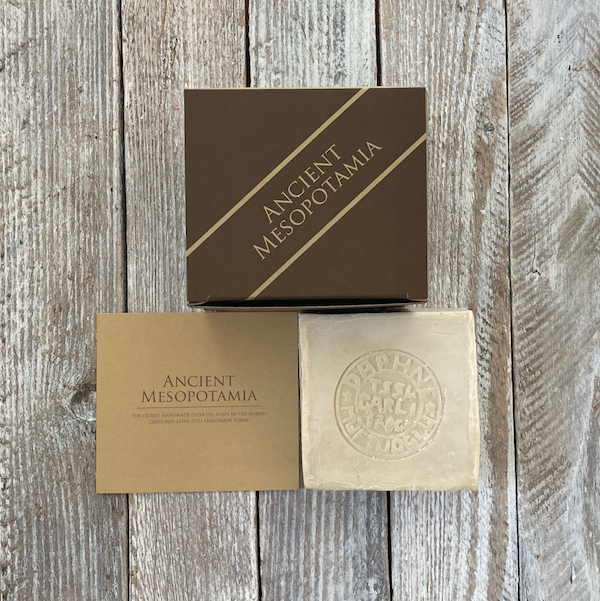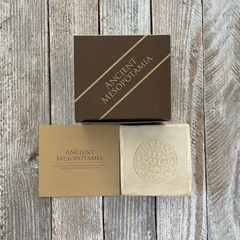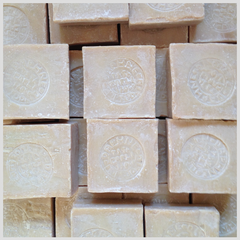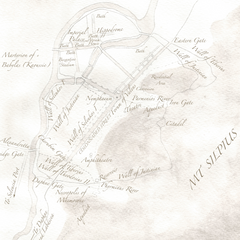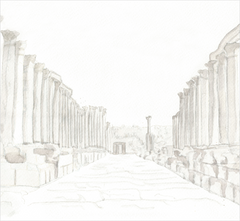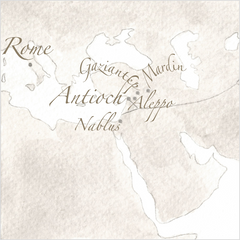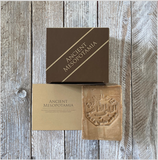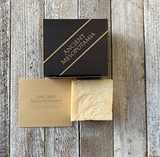Antiochia Soap 35% Pure Laurel Berry Oil 170g Handmade in Hatay Province, The Near East, Hellenistic Art : The Untold Story of Soap. First moisturiser of The Ancient World.
£9.95
PLEASE NOTE : Update : Ladies Co-operative : Syrian Ladies, Ladies from Mardin join forces to continue history producing The Antiochia, The Laurel Leaf, No master stamps on The Antiochia, due to being lost in the earthquake, as Antioch continues to suffer, Earthquake, 6th February 2023 !
ANTIOCHIA SOAP : Biblical ancient Antioch, on The Silk Route; The Seleucid Empire 323-64 BCE after the death of Alexander 111 of Macedon 323 BCE, his territories conquered were divided between his generals, know as 'Diadochi'. Alexander's friend Seleucus Nicator 312-281 BCE became King of the eastern provinces. Hellenistic art, a fusion of Greek and Near East artistry flourished until The The Romans under General Pompey arrived in 64 BCE creating a Roman Province, the third largest City of The Roman Empire, where the abundance of laurel berries were taken daily to Aleppo City for 300 years, whilst olive oil travelled down the Orontes River (125 ft wide), 40 centuries of soapmaking.
The sophisticated City, 1400 Roman columns and porticoes lined the colonnaded street for two and a half miles. Shopkeepers trading below each column would use their vegetable oil filled lamps each night to light up The Colonnaded Street for more than 800 years. The surface of Egyptian granite, ordered by Emperor Antoninus Pius 138 CE - 161 CE paving the great east to west artery wide enough to accommodate caravans, as the merchants passed through buying and selling. Romans, Greeks and local upper classes would holiday and live in the mild climate of Daphne, known for its plethora of thickly planted mulberry bushes, five miles from Antioch. Antioch : the centre of literature, the royal library (223 BCE, under the direction of grammarian, poet Euphorion of Chalcis), theatre, temples, public squares, baths, palatial homes, churches, aqueducts (Hadrian's finest work). Libanius, Antioch's celebrated Orator 314 CE-393 CE ' Indeed, if a man had the idea of travelling all over the earth, not to see how cities looked, but to learn their ways, our city would fulfil his purpose and save him his journeying. If he sits in our market place he will sample every city, there will be so many people from each place with whom he can talk. The city loves the virtues of those who come to it exactly as it does the virtues of its children, imitating the Athenians in this also'.
THE VESPASIANUS - TITUS TUNNEL (The Dam), 1st century CE, Antoninus Pius completes, 2nd century CE (Unesco Tentative Listing) . 10th Legion Engineers, built by Roman Legionaries, Sailors and skilled Jewish Prisoners, more than three quarters of a mile digging into The Nur Mountains. The longest handmade dug tunnel in history, preserved authenticity, without damage still today, ensuring Antioch's seaport Seleucia from silting-up, flooding and water supply during summer.
Third century CE, The Imperial Palace residence of Queen Zenobia (Antiochia, the preference of Queen Zenobia, just a short walk from the Soapmakers), Queen of Palmyra Empire, Queen of Syria, Queen of Egypt, ruler of one third of The Roman Empire (6 years, loved by her people), declaring ancestry with Cleopatra, educated in Greek, Latin, Egyptian (fluent) and Aramaic, defeated by Emperor Aurelius, chained in gold chains, treated with humility but, paraded in Rome for a life in Tivoli, where she re-married and died 34 years old, 4 children.
ANTIOCH : where the word Christianity began implemented by Peter and Paul who converted Gentiles to become Christians. Antioch the centre for the first Christians, the followers of Jesus. Antioch, the centre of the missionary of Paul. Peter digs the foundations of the first church Mount Staurin, Antioch (Unesco Tentative Listing), their missionaries were famous. They both suffered martyrdom under Emperor Nero, Rome.
ANTIOCH : Matthew in all probability wrote his gospel in Antioch where he had long stays. Ignatius, 2nd Century CE, Bishop of Antioch and letter writer refers to material found only in Matthew.
ANTIOCH :
Theatre, Augustus Caesar, enlarged by Agrippa, Tiberius, Trajan, 1st Century BCE - 2nd Century CE. Amphitheatre, from the Greek word amphitheatron, spectators all around, on both sides, Julius Caesar 47 BCE. Hippodrome, Circus, chariot racing, 80,000 spectators, spina divides the course, donated by Quintius Marcius Rex proconsul of Cilicia 67 BCE. Foundation of the Olympic Games under 4th Emperor Claudius 41-54 CE. Daphne : five miles from Antioch, the park of woods that led down to The Mediterranean waters, where every fourth year 45 days July, August 'The Festival of Daphne' Olympics.
BEESWAX CANDLES introduced by The Romans, one hour taper candles with cotton wicks releasing negative ions used by Byzantium churches and the wealthy Antioch,1st Century CE.
ANTIOCHIA SOAP, still handmade today from untreated olive and laurel berry trees, individually stamped (Daphne : ancient Greek meaning laurel), 65% first pressed olive oil, 35% pure laurel berry oil and distilled water. A natural moisturiser, antiseptic, anti-itching and antibacterial, calming sensitive skin, leaving skin soft, nourished and silky, containing no perfumes, artificial colours or, preservatives. Continuing making history remarkably, from the original historical area, directly from the Soapmakers in Biblical Ancient Antioch, Hatay Province, Southern Turkey.
ANCIENT MESOPOTAMIA : Antiochia Soap, Mardin Soap, Aleppo Soap and Nablus Soap; a collection of the first handmade olive oil, laurel berry oil, pistachio oil & almond oil soaps traded on The Silk Route, all from the area of Ancient Mesopotamia, The Fertile Crescent, used by The Emperors, Kings, Queens, Princesses, Pharaohs and the wealthy, centuries later, still handmade today. 2200 BCE (where oils in soap began, Sumerians), a formula of soap consisting of water, alkali (ash) and cassia oil (cinnamomum) was written on a clay tablet (two thousand years before The Silk Route opened).
ANCIENT MESOPOTAMIA : continuing the ethical and sustainable ethos, the culture and spirit of the first Soapmakers of the world remarkably, 40 centuries later, still handmade today from the original historical areas whilst supporting their families.
SOAP : an ancient product, the greatest medical discovery in human history, cleans away something you cannot see, soap does not attract germs, water does, saves the life of a healthy person oblivious to the bullet they dodged, has saved more lives than penicillin, doesn't just make cities healthier it makes them possible, enabling our existence.
NEW EXCAVATIONS : The Plain of Antioch, where history continues to be discovered, THE NEAR EAST, MORE UNTOLD THAN WE THOUGHT.
Ancient Alalakh ( also known as Tell Atchana), 2200-800 BCE, Sir Charles Leonard Wooley 1936-39, 1946-49 on behalf of The British Museum. His discoveries : Palaces, Monuments, Temples, texts in Akkadian, Hurrian, Hittite, Luwain with new addition Sumerian : Amorites, Mitanni's, Hittites, The Archaeological Park (The Alalakh Archaeopark).
PLEASE NOTE : Antiochia, is now without Master Stamp, due to Master Stamps being lost in the Earthquake 6th February 2023 !
Antiochia Soap, history in box, ingredients : Olea Europaea Fruit oil (Olive oil), Laurus Nobilis (Laurel berry oil), Aqua (Water), Sodium Hydroxide (Soda, Oak Ash), Sodium Chloride (Salt). Assists gardeners, eczema, dermatitis, rosacea, Psoriasis. Ancient Mesopotamia products contain no perfumes, artificial colours or, preservatives. Ancient Mesopotamia products are not tested on animals and are 100% biodegradable. 170g ℮.
